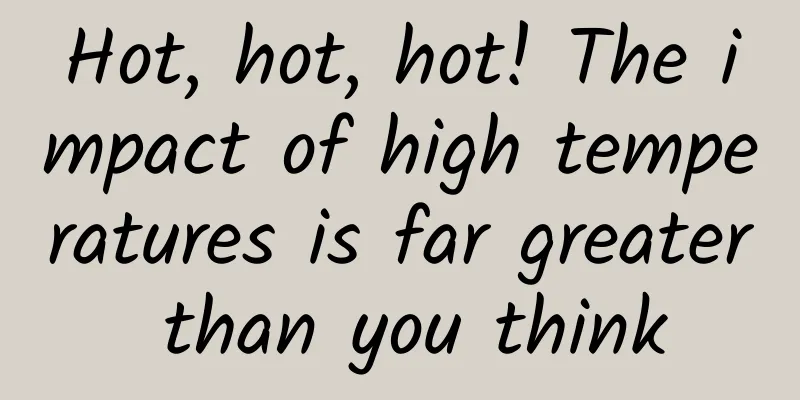Hot, hot, hot! The impact of high temperatures is far greater than you think

|
Recently, the Central Meteorological Observatory has frequently issued high temperature warnings, and the highest temperature in many places in North China has reached 40℃, which is unbearable! In this hot and unbearable environment, how to scientifically protect your health and avoid misunderstandings about heatstroke prevention has naturally become a top priority. 1. The impact of high temperature is far greater than you think The impact of high temperature is not just sweating and irritability. In a high temperature and high humidity environment, the body's temperature regulation will be disrupted, causing a series of symptoms. The human body temperature is usually around 37°C, and the skin temperature is 33°C under normal circumstances. When the temperature exceeds 33°C, we will feel hot, and the human body will regulate the body temperature through mechanisms such as sweating to dissipate the accumulated heat in the body. When the temperature exceeds 35°C, in order to transport blood to the surface of the skin to help dissipate heat, the heart needs to beat faster, and blood circulation will also speed up; the secretion of human digestive juices may decrease, but in order to maintain the body's energy supply, the body will mobilize other energy reserves, such as fat and protein, which will also speed up metabolism, and may also cause a drop in blood pressure and an increase in blood viscosity, thereby causing a series of cardiovascular diseases. High temperatures also increase the workload of sweat glands. Excessive sweating leads to dehydration and electrolyte (such as sodium, potassium, etc.) disorders, followed by symptoms of heat stroke. When you work or exercise for a long time in a hot environment, you may experience dizziness, headache, weakness in the limbs, and inattention, which means you may have entered a state of pre-heatstroke . If you fail to intervene in time, it will progress to mild heatstroke , accompanied by flushing, heavy sweating, burning skin, or cold limbs, pale face, decreased blood pressure, increased pulse, etc., and the body temperature often exceeds 38℃. If it develops into severe heatstroke , the patient will experience high fever, cramps, convulsions, shock, coma and other symptoms, which may be life-threatening. From this point of view, "heat killing people" is definitely not groundless or exaggerated! Severe heatstroke can be divided into heat cramps, heat exhaustion and heat stroke according to different manifestations. Heat stroke is the most serious type, characterized by increased core body temperature (>40°C) and abnormalities in the central nervous system. According to relevant data, there are many deaths caused by heat stroke every year. Heat stroke is easily caused by strenuous physical labor or intense exercise in a high temperature environment, as well as passive exposure of the elderly, weak and chronic patients to a hot environment. Its symptoms include high fever, impaired consciousness (such as delirium, convulsions, coma), and multiple organ system damage. 2. Preventing heat stroke : predicting in advance and responding scientifically In order to reduce the adverse effects of high temperatures on our health, we must master scientific and effective protective measures and identify signs of heat stroke as early as possible. First, pay attention to weather forecasts and high temperature warnings in a timely manner . This is like knowing in advance that a computer will overheat, so we can prepare in advance. In hot weather, remember to prepare sunscreen when going out during the day, and try to avoid or reduce outdoor activities, especially do not go out for exercise or work under the scorching sun between 10 and 16 o'clock. Secondly, drink water before you feel thirsty . If you work in hot weather, drink a glass (about 240 ml) of water every 15-20 minutes, 1 liter of water per hour, and check your urine to see if you are hydrated. Third, learn to observe your body's reactions . When you feel dizzy, thirsty, or flushed, be alert. At this time, stop the activity immediately, find a cool place to rest, and replenish water and electrolytes. If your companions have symptoms of heat stroke, these methods can also help you respond quickly: 1. Immediately transfer the patient to a cool place : Quickly transfer the patient from a high temperature environment to a cool and ventilated place to avoid continued exposure to high temperatures. 2. Rapid cooling : Take measures such as artificial heat dissipation, cold compresses with wet towels, ice compresses underarms, and alcohol body rubs to help lower the patient's body temperature. 3. Rehydrate : If the patient is awake and able to swallow, give appropriate amounts of refreshing drinks, but avoid giving drinks containing caffeine or alcohol. 4. Monitor breathing and pulse : Try to keep the patient calm, avoid unnecessary activities, and observe the patient's breathing and pulse to make sure they have not stopped breathing or have serious heart problems. 5. If the patient has serious symptoms, such as unconsciousness, persistent high fever, convulsions, etc., call the emergency number immediately to seek professional medical help. While waiting for the ambulance to arrive, continue to observe the patient's symptom changes. Remember, heat stroke is an emergency that requires immediate action. If you suspect someone has heat stroke, do not hesitate to start first aid measures and seek professional medical help. 3. Should we stay at home during high temperatures? Don’t fall into these heatstroke prevention misunderstandings Some people may ask, if I stay at home in hot weather, can I avoid feeling unwell? The answer is not so. Although staying indoors can avoid the sun, some misunderstandings can also cause health problems if you don't pay attention to them. 1. Beware of "indoor heat stroke" Did you know that heat stroke can occur not only in outdoor exposure, but also in a hot and humid indoor environment with poor ventilation, the concentration of carbon dioxide in the air increases, the oxygen supply is insufficient, and pollutants and dust in the air may irritate the respiratory tract and skin, which is more likely to cause symptoms such as headaches and dizziness. In particular, some frail and elderly people who want to save electricity or do not like to use air conditioners or fans can also cause dysfunction in the body temperature regulation center and induce heat stroke. If you close the doors and windows and turn on the air conditioner for an hour, the indoor carbon dioxide concentration may exceed the standard. When the oxygen content in the environment is low, it will lead to excessive breathing, the lungs will expel a large amount of carbon dioxide, and respiratory alkalosis will be caused. 2. Over-reliance on air conditioning may lead to cardiovascular and cerebrovascular diseases When the human body is in a low-temperature environment for a long time, especially when it is directly exposed to the cold air from the air conditioner, the blood vessels will contract when exposed to the cold. This contraction will not only cause high blood pressure and increase the burden on the heart, but may also induce serious diseases such as myocardial infarction and cerebral infarction. At the same time, staying in an air-conditioned room for a long time may also lead to a decrease in the body's adaptability. Once you leave the air-conditioned environment, you are more likely to get heatstroke. You can reduce the direct stimulation of cold air on the human body by adjusting the air-conditioning wind direction and setting a suitable temperature. When using air conditioning, pay attention to maintaining an appropriate temperature difference between indoors and outdoors, generally recommended to be between 5-8°C. 3. Drink tons of boiled water, be careful of dehydration Although drinking a large glass of water is refreshing, it may lead to further dehydration, because the body has lost electrolytes when dehydrated. If you drink a lot of water at this time, the electrolyte concentration in the body fluid will be further diluted. In order to maintain the original electrolyte concentration, the body will work hard to drain water, which is "spontaneous dehydration". It is easy to make you thirstier the more you drink, and the more you drink, the more you drain. The symptoms of dehydration are not only not relieved, but aggravated. Therefore, while replenishing water, don't forget to replenish electrolyte water. Although hot weather is unbearable, only by taking correct anti-heat measures and protecting our own health can we spend a safe and comfortable summer. Author: Li Nannan, Second Level Researcher of Hunan Association for Science and Technology, Director of Hunan Science Writers Association Reviewer: Tang Qin, Deputy Secretary-General and Senior Researcher of the Expert Committee of the Chinese Medical Association Produced by: Science Popularization China Produced by: China Science and Technology Press Co., Ltd., China Science and Technology Publishing House (Beijing) Digital Media Co., Ltd. The pictures and cover picture of this article are from the copyright gallery. Reprinting and using them may cause copyright disputes. |
<<: Is the mosquito repellent song that is popular on the Internet really effective?
>>: Father's Day丨The "invisible" changes in your body before and after becoming a father
Recommend
Why is the website K-ed? The reason why the website is K-ed: it turns out to be these SEO common sense that are easily overlooked
Recently, many customers have consulted me and as...
Case analysis: How 51talk converts private domain traffic
The 2020 epidemic did not bring any benefits to p...
Beauty content marketing trends on Tik Tok, Kuaishou, and Xiaohongshu!
During Q2 2020, what new trends are there in cont...
Those who redefine loyalty
Leviathan Press: If a tree falls in a forest with...
How to promote a new brand?
The relationship between brands is like the relat...
Yangjiang Mini Program Agency Company, how much does it cost to be an agent for an animation mini program?
Why should you be an agent for WeChat Mini Progra...
“Complete equality between men and women” is not fair. Working mothers should bravely fight for their rights.
Yesterday, we published the first half of the con...
Why is it so difficult to manufacture a tiny chip?
In the digital age, all of us cannot live without...
Planning a New Year's Eve dinner? Don't worry, I have a secret for you!
This article was reviewed by Li Lin, PhD in Food ...
How much does it cost to develop a mini program?
The editor still says the same things as before. ...
A woman suffered from hypothermia while rafting in a 41-degree hot weather, which is more terrible than heatstroke!
In summer, many people will choose some water act...
A Preliminary Study on Android Kotlin Coroutines
1. What is it (coroutines and Kotlin coroutines) ...
It’s the beginning of autumn! Who put on weight last year and hasn’t lost it this year?
What do you think of when you mention the beginni...
How to acquire high-value and accurate users at low cost?
Before a product goes online, if you are an opera...









